|
| |
This week in: Peace & Security Publications |
IPSI | Africa | Americas | East Asia | Middle East | South Asia
|
|
|
|
| |
|
This week in Peace & Security Publications
|
|
|
|
| |
“Just Let Us Be” Discrimination Against LGBT Students in the Philippines
Schools should be safe places for everyone. But in the Philippines, students who are lesbian, gay, bisexual, and transgender (LGBT) too often find that their schooling experience is marred by bullying, discrimination, lack of access to LGBT-related information, and in some cases, physical or sexual assault. These abuses can cause…
|
|
|
|
|
|
| |
Humberto De la Calle, Chief Negotiator for the Colombian peace process, spoke with the Bologna Symposium participants over video last week. Click here to read the English translation of the keynote speech!
|
|
|
|
| |
Blog: If Walls Could Talk
From the rooftops, statues of popes, saints, and figureheads stand – gazing over the area – to demonstrate their power to proliferate the values they support. Simultaneously, the graffiti speaks from distinct voices and groups – showing a clear hierarchy of power or defiant position of opposition…
|
|
Blog: From a Shattered Hand to a Shocking Experience in Sri Lanka
I had the opportunity to ask Dr. Hoppman what was the most shocking experience he had ever witnessed. He began telling us a short story about his trip to Sri Lanka – around 8 years after several massacres…
|
Blog: Proactively Preventing Conflict vs. Reactively Resolving Conflict
Dr. Neu spoke to a need to address the root cause of the conflict and not just the symptom, a perspective that resonates deeply with me, not only in my capacity of a Criminologist but, and perhaps more importantly…
|
|
|
|
|
|
| |
|
This week in Sub-Saharan Africa
|
|
|
|
| |
CENTRAL AFRICAN REPUBLIC: Armed groups sign church mediated peace accord
On Monday, 13 out of 14 armed groups signed a peace accord with the government. The 14th group could not attend, but expressed willingness to participate. The Roman Catholic Sant’ Egidio peace group mediated the accord which called for an immediate end to hostilities and the recognition of the results of the last elections, in exchange for political representation. One day after the signing, 50 people died following a fight between mostly-Muslim rebels and Christian anti-balaka fighters near a camp housing displaced civilians. One of the 13 groups admitted retaliatory participation. Comment: The country has been experiencing religious and communal conflict since 2013, when the mainly Muslim Seleka rebels seized power, causing a retaliation from the mostly Christian anti-Balaka militia. The signed agreement is the latest of several short-lived accords in the country. (Reuters, AllAfrica, ReligionNews, WorldWatchMonitor, Washington Post)
|
|
|
|
|
| |
DEMOCRATIC REPUBLIC OF CONGO: Government-backed militia accused of mutilating civilians
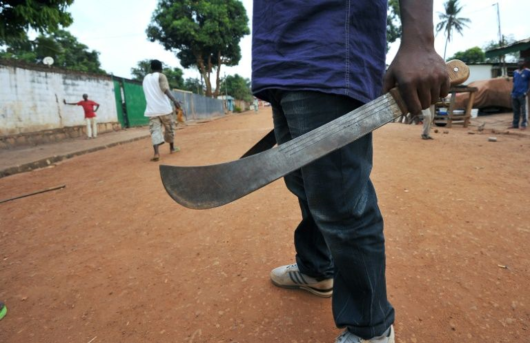 |
|
On Tuesday, the UN Human Rights commissioner, Zeid Ra’ad al Hussein, reported that the Bana Mura, a government backed militia, has committed ethnically-motivated attacks on hundreds of villagers in the Kasai provinces over the past two months. The attacks include cutting off toddlers’ limbs and slicing open pregnant women from the Luba and Lulua ethnic groups in the Kasai provinces. Al Hussein called for an independent-international investigation. The government is willing to collaborate with the UN in the investigation, claiming it was the Kamuina Nsapu rebels who committed the atrocities. Comment: The Kamuina Nsapu rebels arose after the government refused to recognize their traditional chief. The Catholic Church has reported 3,000 deaths since September when the ethnic conflict began in the Kasai provinces. The government formed the Bana Mura militia two months ago in an attempt to control the conflict. (JournaldeBrazza, Reuters, AfricaTimes, AllAfrica 1 ,2)
|
|
|
|
|
| |
SOMALIA: Car bombing on government building
On Tuesday, a car bomb attack targeting a government building housing Somali officials killed at least 10 in the Somali capital Mogadishu; 20 others were wounded. According to a government official, Al Shabaab, an Al Qaeda affiliate, claimed the attack, which destroyed the Wadajir District headquarters and more than 10 cars. Comment: The attack comes less than a week after a car bomb killed 31 people at a restaurant in Mogadishu. Al Shabaab has also targeted the Somali parliament, Supreme Court offices, and the presidential palace. (Reuters, Express, AlJezeera, The Atlantic)
Researched/Written by Angelica Aimé Silfa
|
|
|
|
|
| |
|
This week in the Americas & Caribbean
|
|
|
|
| |
ECUADOR/PERU: Construction of border wall causes fierce disputes
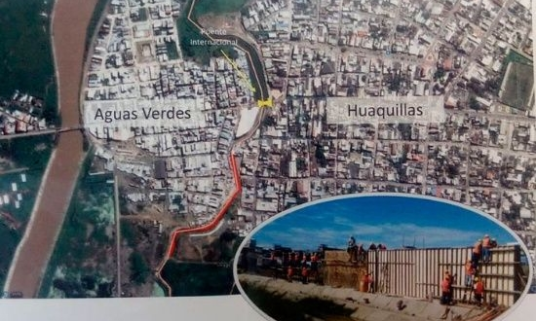 |
|
On Friday, the Peruvian Foreign Minister announced that discussions would take place with Ecuadorian diplomats regarding their construction of a 2km-long wall near the joint border. Peruvian top diplomat, Hugo de Zela, requested this bilateral meeting to demand the immediate cessation of its construction. Peru warns about the flood risk in addition to the social and economic implications the wall could have; Ecuador assures that its objective is to fight contraband in one of the highest transit areas on the 1,500 km-long border, as well as regenerating surrounding urban areas. Comment: The Ecuadorian wall is being built along the International Zarumilla Canal that separates the Ecuadorian city of Huaquillas with the Peruvian Aguas Verdes. Peru’s rejection is most importantly based on a violation of the 1998 Brasilia Accords, which ended a three-year conflict between the two countries – leaving several hundred dead. Article 21 of the Accords demands that Ecuador maintains a 10-meter distance from the right bank of the Canal in any construction. (Peru 21, 1, 2, El Pais, The Guardian)
|
|
|
|
|
| |
VENEZUELA: Country poised for further escalation of violence
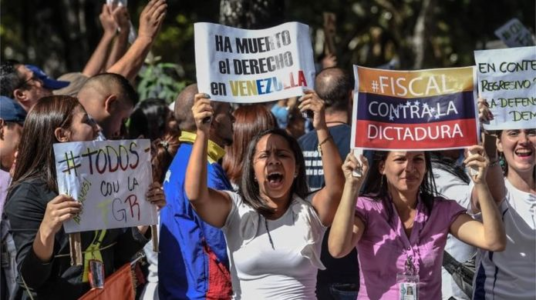 |
|
On Monday, the National Bolivarian Guard (GNB) opened fire on protesters in Caracas, killing 17-year-old Fabian Urbina. The next day, Venezuela’s Attorney General Luisa Ortega Diaz, once a staunch ally of the Maduro government – despite recently been speaking out against it – was denied protection from prosecution for allegedly committing “serious errors” in her role. Both acts have been criticized by opposition activists as an “excessive use of force” and power, and have prompted fresh outrage. On Wednesday, the Minister of the Interior and Justice announced that three members of the GNB were detained for their responsibility in Urbina’s death and their “disproportionate use of force.” Comment: In 2015, new laws enabled the “use of potentially lethal force” by the National Guard in civil defense roles. Protests led to a revision of these laws, but no public statement was officially made. More than 70 people have died since protests erupted throughout the country in April. (El Nacional, The Guardian, Nuevo Herald, BBC News)
|
|
|
|
|
| |
REGIONAL: OAS General Assembly fails to pass resolution on Venezuela
On Wednesday in Cancun, Mexico, the participant states of the 47th General Assembly of the OAS failed to approve a resolution pushing for a political solution to Venezuela’s ongoing crisis. Of the 35 members, only 20 votes were in favor of implementing the resolution. The resolution required 23 to pass. Opposed were staunch Venezuelan allies, including Nicaragua, Ecuador and Bolivia, as well as the Caribbean Community (CARICOM) who was divided on their positions; San Vincente and Grenadines, Dominica and St. Christopher and Nevis voted against the resolution, while Haiti, the Dominican Republic, Granada, Trinidad and Tobago, and Antigua and Barbuda abstained. Comment: This meeting was allegedly Venezuela’s final General Assembly, since President Maduro withdrew Venezuela from the OAS in April; a process that will take two years to complete. The OAS resolution focused on preventing the creation of a constitutional assembly, the release of political prisoners, and the determination of an electoral calendar. (Miami Herald, Ecuavisa, El Nuevo Herald 1, 2, Reuters, The Dialogue)
Researched/Written by Nastasia Stipo
|
|
|
|
|
| |
|
This week in East Asia & Pacific
|
|
|
|
| |
AUSTRALIA: Australian Defense Force lifts suspension on Syrian airstrikes
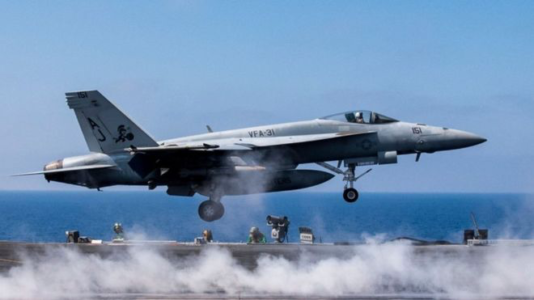 |
|
On Thursday, the Australian Defense Force (ADF) announced that it would resume airstrikes against the self-proclaimed Islamic State (IS) strongholds in Syria after declaring a temporary suspension of all air missions on Tuesday. The ADF reported that the temporary suspension had been “a precautionary measure to allow the coalition to assess the operational risk.“ There is no report on what precipitated the sudden lift on the suspension nor how long the current suspension will last. Comment: The suspension is a precautionary measure in response to increased tensions between U.S. and Russia over Syria after the U.S. shot down a Syrian military plane on Sunday. The Russian government threatened to target U.S. and its allies’ aircraft in Syrian airspace, while also suspending a deconfliction communications hotline between the U.S. and Russia. Australia is a member of the U.S.-led coalition combating IS in Syria and Iraq. (Reuters, The Australian, BBC, ABC)
|
|
|
|
|
| |
INDONESIA: Indonesian parliament addresses Indonesian participation in terrorist organizations
On Wednesday, the Indonesian government added provisions to its 2003 Anti-Terrorism Bill specific to Indonesian citizens that join terrorist organizations overseas. Under the new law, Indonesian citizens who return to the country after fighting for a terrorist organization face up to 15 years of incarceration. The government will officially enact the law in September. Comment: The proposal comes in light of the involvement of Indonesian citizens in terrorist attacks by the self-proclaimed Islamic State (IS) in southeast Asia and military intelligence suggesting the presence of IS sleeper cells in most of Indonesian provinces. According to Indonesian intelligence, about 400 Indonesians have joined IS abroad. Before these amendments, Indonesian anti-terrorism legislation had not explicitly condemned participation in terrorist organizations overseas. (Sydney Morning Herald, Strait Times, Reuters)
|
|
|
|
|
| |
THAILAND: Roadside Bomb Kills 6, Wounds 4 Thai Soldiers in Pattani
On Monday, a roadside bomb wounded four Thai soldiers and killed six in Thai’s Southern Province of Pattani. The soldiers were part of a patrol mission to root out separatist insurgent groups. Thai authorities have arrested ten suspected militants and seized an arms cache from Pattani after conducting raids in response to the attack. Comment: Intermittent strife between the government of Thailand and ethnic Malay insurgents in a struggle for greater autonomy has wracked Pattani and its neighboring provinces of Yala and Narathiwat since 1948. Although Thailand’s military government has hosted Malaysian-mediated peace talks since 2015, the talks have largely stalled, and attacks continue. Since 2004, the conflict has killed roughly 6,500 people. (Reuters, Channel News Asia, The Bangkok Post, The Star)
Researched/Written by Laura Bisbee
|
|
|
|
|
| |
|
This week in Europe & Central Asia
|
|
|
|
| |
BELGIUM: Security alert level high for EU summit following Central Station attempted terror attack
 |
|
On Tuesday, Belgian soldiers shot and killed a terror suspect after he partially set off an explosive device at the capital train station around 18:30 GMT. The suspect was in possession of multiple homemade explosives, including bombs filled with nails and bottles of gas, and is believed to have been a sympathizer of the self-proclaimed Islamic State (ISIS). Belgian Prime Minister Charles Michel announced Wednesday that additional security measures are being adopted around the country, and all public events will see stronger military and police presences. Comment: The attempted mass casualty attack came on the heels of several similar terror attacks in London and Paris, and just days ahead of the capital hosting a summit of European Union leaders on Thursday and Friday. Belgium has been in a heightened state of alert since the 2016 Paris attacks claimed by ISIS, and is currently at security level 3 on a scale of 1-4. (Brussels Times, Flanders News, Reuters, BBC, Al Jazeera)
|
|
|
|
|
| |
BOSNIA AND HERZEGOVINA: Students rally against ethnic segregation in schools
| |
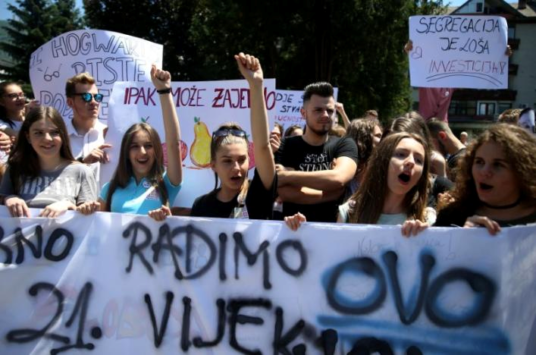 |
On Tuesday in Travnik, more than 100 high school students and activists gathered together in protest of the Bosnian school system’s decades-long practices of ethnic segregation whereby Bosniak, Serb, and Croat pupils are kept separated and taught different ‘national’ curricula. Previous protests were victorious in preventing the establishment of a new segregated school in the town of Jajce, but dozens of other segregated schools still operate around the country. Policies of school segregation and differentiated curricula were introduced following the Balkan war in the 1990’s. Comment: Defenders of the segregated school system say it “preserves ethnic identity and prevents one ethnic group from dominating another,” while protesters say the destructive system breeds intolerance and fuels ethnic tensions. Student protests like these show that younger generations of Bosnians are actively rejecting decades-old divisive policies. (Balkan Insight, Channel NewsAsia, Reuters, BBC)
|
|
|
|
|
| |
REGIONAL: Switzerland to aid in water resource management in Central Asia
On Sunday, Swiss Federal Councilor and foreign minister Didier Burkhalter opened the “Blue Peace Central Asia: Dialogue for 2030 – Water Security and Inclusive Growth” Conference in Kazakhstan, and met with the leaders from Kazakhstan, Uzbekistan, Kyrgyzstan, Tajikistan, and Turkmenistan. The Swiss initiative aims to create collaborative water resource management schemes between all five Central Asian countries in order to ensure peace and development in the region and the world. The conference also addressed the growing global water crisis, including the decrease in accessibility and availability of water per capita, water waste, and the misuse of water resources as a weapon of war. Comment: Cooperation between the Central Asian countries is vital in order to prevent potential regional conflicts over shared water resources. Switzerland previously participated in conferences on water management in Central Asia in 2014 and 2016. (Astana Times, KazInform, Swiss Info, Swiss Federal Council 1, 2)
Researched/Written by Natalie A. Landau
|
|
|
|
| |
|
This week in the Middle East & North Africa
|
|
|
|
| |
ISRAEL/PALESTINE: President Trump’s son-in-law, Jared Kushner, meets with Israeli and Palestinian leaders
On Wednesday, Jared Kushner, President Trump’s son-in-law and chief Middle East adviser at the White House, arrived in the Middle East. He met with Israeli Prime Minister Netanyahu in Jerusalem, and then with Palestinian President Mahmoud Abbas in Ramallah, with the goal of reviving peace talks. He was assigned what Trump calls the “ultimate deal” task. The White House described the meeting between Netanyahu and Kushner as “productive.” Palestinian presidential spokesman Nabil Abu Rudainah said on Thursday Abbas and Kushner discussed all final status issues including issues of refugees and prisoners. This attempt by Kushner, a former real estate developer who is inexperienced in diplomacy and international negotiations, comes at an especially challenging time in the region; Palestinian leadership is fractured, and the Israeli government is controlled by a right-wing coalition. Comment: This month marks the 50th anniversary of Naksa Day (meaning the “day of the setback” in Arabic) when Palestinians commemorate the displacement that accompanied the Israeli occupation following the Six Day War. (Wafa, Aljazeera, The Independent, The Guardian)
|
|
|
|
|
| |
SAUDI ARABIA: Mohammed bin Salman named crown prince
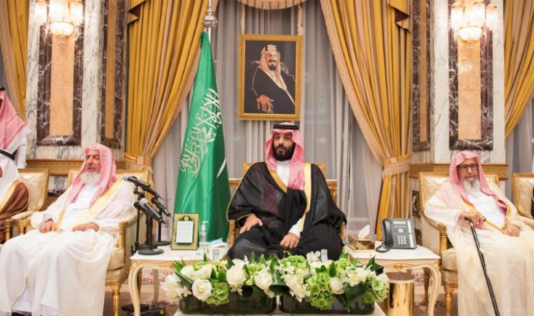 |
|
On Wednesday, a royal decree announced that King Salman bin Abdulaziz replaced his cousin Mohammed bin Nayef, a veteran security chief who led the Saudi campaign against Islamic State and al Qaeda, with his 31-year-old son Mohammed, to be the new crown prince and first in line to the throne. Mohammed bin Salman, who was formerly a deputy crown prince, retains his other positions as the Defense Minister and head of the Council for Economic and Development Affairs. The Saudi Council of Allegiance voted 31 out of 34 in support of the promotion of Prince Mohammed bin Salman. No explanation was given for the move. Comment: This promotion was expected among those who follow the Saudi Royalty; however, the timing was surprising, especially in regards to the escalating tension with Qatar. In a conciliatory gesture from Qatar, Sheikh Tamim bin Hamad, Qatar’s Emir, congratulated Prince Mohammed bin Salman. (Al Arabiya, Raialyoum, BBC, Reuters, The Guardian, The Independent).
|
|
|
|
|
| |
SYRIA: Russia warns U.S. war planes flying west of the Euphrates
On Monday, Russia warned that any U.S. or coalition aircraft flying west of the Euphrates River will be considered an “air target” for the Russian forces in Syria. This warning came after the U.S. shot down a Syrian jet on Sunday. Russian Ministry of Defense described downing the Syrian jet as a “flagrant violation of international law, and actual military aggression against the Syrian Arab Republic.” A pentagon spokesperson stated, “U.S. pilots in Syria won’t hesitate to defend themselves.” Comment: This confrontation represents a further escalation between Russian and U.S. forces fighting in Syria and distracts from fighting ISIS, which they say is their major goal for now. (SANA, Russia Today, The Washington Post, BBC, Reuters)
Researched/Written by Atika Alkhallouf
|
|
|
|
|
| |
AFGHANISTAN: Suicide car bombing near Kabul Bank kills at least 34 in Helmand Province
On Thursday, a suicide car bomb killed at least 34 people and injured 60 in Lashkar Gah, capital of the Helmand province. This particular bank handles salary payments for police, soldiers and government officials; however, most of the casualties were civilians. The bombings targeted government officials collecting their wages at a bank at the end of the week before Eid-ul-Fitr. Comment: No one has officially claimed responsibility for the act, though the Taliban have launched several attacks in the Helmand Province since April as part of their spring offensive in April. This bombing takes place after five police officers were killed and 30 civilians injured in a suicide blast in Gardez on Sunday. (Afghanistan Times, Dawn, Al Jazeera, BBC, Reuters, NYTimes)
|
|
|
|
|
| |
INDIA: Police in India arrest 15 fans celebrating Pakistan’s cricket championship victory
On Sunday, Indian police arrested 15 Muslim men comprised of students, laborers, and shopkeepers in Madya Pradesh and Karnataka, for joyously celebrating Pakistan’s victory against India in the International Cricket Championship this weekend. They were charged with sedition for lighting fireworks, as well as shouting pro-Pakistani slogans and anti-India slogans. Amnesty International condemned the arrests and demanded their immediate release. The sedition charges were dropped on Thursday, but the charge of disturbing communal harmony remains. Comment: Members of both countries have received sedition charges in the past for celebrating rival cricket victories. Tensions have recently escalated between India and Pakistan due to violence on both sides of Kashmir. Indian sedition laws include anti-national speech as illegal. (Al Jazeera, 1, 2, Amnesty International, BBC, NYTimes, Newsweek)
|
|
|
|
|
| |
SRI LANKA: Severe drought followed by floods threatens food security
On Thursday, the UN Food and Agriculture Organization reported that severe drought followed by heavy rains in May threatens food security in Sri Lanka. The volatile weather caused widespread crop failure; total rice production in 2017 decreased by 40 percent compared to 2016. Since families are unable to grow crops, they must buy food at elevated prices in local markets or eat less than usual. Comment: This past year, Sri Lanka experienced the worst drought in decades, followed in May by the worst rainfalls in 14 years, killing 200 people. (Colombo Page, Colombo Gazette, Thomas Reuters Foundation News, FAO)
Researched/Written by Rabia Uddin
|
|
|
|